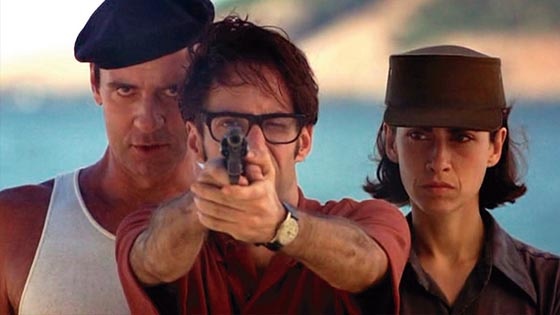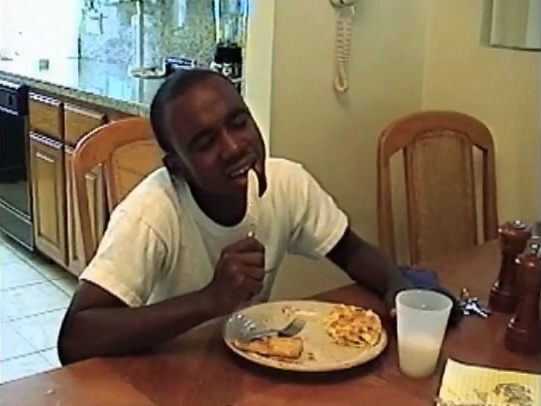Film Reviews: More Movies to Watch While Sheltering in Place — Stir-Crazy 4
By Gerald Peary
Six more feature films of great interest and their links, carefully chosen to get you through the travails of the coronavirus.

A scene from Four Days in September.
Four Days in September (1997) — Here’s the kind of ideologically coherent, true-to-history political drama that hardly get made anymore. Filmmaker Bruno Barreto returned to Brazil 1969, when a group of idealistic students went underground and formed a Marxist guerilla cadre called the October 8 Revolutionary Movement. At first they robbed banks. Then they kidnapped the American ambassador, Charles Burke Elbrick, demanding the release of 15 political prisoners. The scenes among the young revolutionaries feel very credible, and there’s a winning performance by Alan Arkin as the Republican ambassador, who proved a model prisoner. In 1997, his daughter said of her late father: “He felt close to those who abducted him. He was treated well. He was impressed by their idealism.” https://www.youtube.com/watch?v=4FRtkEbQ-8U
Chain Camera (2001) — It was a simple but immensely effective idea: supply students at LA’s multi-ethnic John Marshall high school with video cameras and allow them to make mini-movies documenting their lives. After a week of shooting, they passed the cameras on to other students. Lots of video bios four to six minutes in length resulted. The most enticing of them, 16 in all, were seamed together by filmmaker-documentarian Kirby Dick into a sympathetic, endearing 90-minute work. Virtually all of the choices are good ones, and everyone watching will have their favorites. I loved a film showing a once-legally blind boy who has gained his sight but now finds himself, an admitted virgin, shy when girls ask him on dates. The most touching short of all shows the relationship between a chubby Latino girl and her extremely obese father, whom she’s afraid will die. $1.99 rental. https://www.youtube.com/watch?v=ZUN3n22DdRk

A scene from Chain Camera.
Childstar (2004) — Directed and written by my Toronto friend Don McKellar, Childstar is an intensely personal and provokingly political satire about how Canada is stepped on by the feel-good face of imperial Hollywood. The film concerns a runaway LA studio action picture being shot in Toronto — only to take advantage of the lowly Canadian dollar. McKellar plays a version of himself, a Canadian intellectual who is hired by, pulled about by, and somewhat seduced by the American production — they’ve got the cash! — while he clings tenuously to his aesthetic integrity by doing experimental movies. The title character is a teen kid from the US who treats everyone involved in the production (hired Canadians) like immigrant underlings. He’s played by Mark Rendell, a Canadian. “When Mark first interviewed,” McKellar explained at a press conference, “I thought he was too nice, not convincing as a prick or an American.” https://www.youtube.com/watch?v=iV221575oSE
Super Size Me (2004) — Are you so sick of cooking at home that even a fast-food burger starts sounding delicious? A look at Morgan Spurlock’s muckraking mock comedy should dissuade you; he spends 30 straight on-camera days binging on MacDonald’s, gorging on three greasy, revolting calorie-and-cholesterol-packed meals each 24 hours. Breakfasts, lunches, dinners, spilling into each other. Spurlock becomes a digesting machine of Big Macs and beyond: elephantine shakes, massive burgers, egg McMuffins galore. His weight? The studly, in-shape filmmaker transforms into the pudgy beginnings of Michael Moore. The whole film, in fact, is Moore lite, and Spurlock is as much a camera hog and ham as the Bowling for Colombine maestro. But give Super Size Me credit. I recall when it came out many vulnerable people pledged never again to darken those beckoning yellow arches. https://www.youtube.com/watch?v=zKQGAv8gtBA

A scene from The Case of the Grinning Cat
The Case of the Grinning Cat (2004) — The spry then-octogenarian documentarian, Chris Marker, who died in 2012, played detective with a camera in this effort, finding cartoon felines with half-moons of teeth drawn high up on Paris buildings. What gave with this anonymous public art, an homage both to Japanese manga and Lewis Carroll’s Cheshire Cat? Those familiar with such classic, rapturous socio-political filmic essays as La Jetée (1962) and Sans Soleil (1982) will want to see this Marker work even though it’s a modest one, simply and informally shot, and with few self-consciously poetic visual moments. It’s Marker on a lark: familiar walks through his Paris with a hand-held video camera. Without a plan, he films whatever catches his interest, from a live cat lounging on the metro stairwell to a frightened one caught up a tree, from bands playing for spare change to students united in protest against the immigration philosophy of rightist Jean-Marie Le Pen. Wherever he shot, Marker seemed to find pretty coeds. Was that just France, or the still-libidinal eye of the filmmaker? https://www.youtube.com/watch?v=xWOQEyRWaTY
Starting Out in the Evening (2007) — Andrew Wagner’s enchanting, civilized feature is a practically note-perfect work, with a miraculous performance by Frank Langella as the aging, widowed Jewish novelist Leonard Schiller. He’s banished eros from his life so he can finish one more work. But in the door comes an insistent, precocious, somewhat sexy Brown graduate student (Lauren Ambrose), intruding on his ascetic existence. As played with meticulous tenderness by Langella, Schiller’s got dignity and old-school soul; he’s a remnant from the New York intellectual 1950s. He’s courtly, reticent, a gentleman’s gentleman, wearing a jacket and tie even when he’s glued to his manual typewriter. Here’s something to celebrate: a main character in an American movie who is an unapologetic thinker and intellectual. $3.99 rental. https://www.youtube.com/watch?v=_fwCK1Zz2aw
Gerald Peary is a Professor Emeritus at Suffolk University, Boston, curator of the Boston University Cinematheque, and the general editor of the “Conversations with Filmmakers” series from the University Press of Mississippi. A critic for the late Boston Phoenix, he is the author of nine books on cinema, writer-director of the documentaries For the Love of Movies: the Story of American Film Criticism and Archie’s Betty, and a featured actor in the 2013 independent narrative Computer Chess. His new feature documentary, The Rabbi Goes West, co-directed by Amy Geller, is playing at film festivals around the world.

Thank you— plan on watching some of these and wouldn’t have have done so without this excellent curated list!